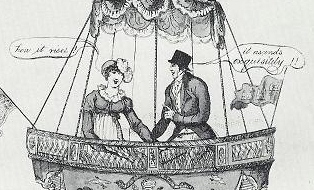

With all the holiday family-togetherness, and talking here about what a Regency Christmas might be like (no crowded malls! no animatronic Santas singing Grandma Got Run Over by a Reindeer!), I started considering romances which also feature relationships other than the main, h/h thing. Namely–family relationships.
We do see them a lot. You know, the ones where 30 siblings find their perfect loves in 30 books and have a big, happy reunion at the end of Book #30. My own family gatherings are seldom like this, and I imagine most family gatherings in the Regency weren’t, either. With my own family, someone is always not speaking to someone else. Someone gets drunk and cries and/or shrieks. The dog eats pizza and throws up on the carpet. My cousin’s kid takes his diaper off and runs around naked. You get the picture. It’s not so pretty. Hmm-now that I think about it, family reunions in the Regency probably weren’t like THAT, either. Georgian, maybe. 🙂
But there are books (even ones in mega-series!) that can capture the timeless best of families and friends. Their loyalty, their unconditional love, the way they might pick on you mercilessly but God help any outsider who dares to do the same. Family problems and stories never really get solved–they just go on and on, and we learn to live with them, and they become part of us. Some authors have captured these dynamics so well. Mary Balogh’s “Slightly” series. Mary Jo Putney’s Rogues. Gaelen Foley’s Knights. To name just a very few. (I’m sure I could find more if my shelves weren’t blocked by a Christmas tree and a heap of presents waiting to be wrapped). Jane Austen, of course, was ALL about family dynamics, and no one (with the probable exception of Shakespeare) had a greater grasp on the timeless give- and-take exasperation of relatives.
In my own books, I have lots of friends who have “made” families together, a few sisters, a couple of brothers, a mother or two. An aunt and uncle who are surrogate parents. Strangely, I find it harder to write about brothers than sisters, even though I have no sisters of my own. Families have made my characters who they are. They teach them how to love–or not to love!
What are some of your favorite “family” books or series? Why do you love them? Or hate them?


